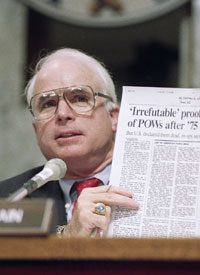
Considering that John McCain himself was a POW during the Vietnam War, why is he so dismissive of the evidence that other POWs remained in captivity after the war’s end?
“When the Senate created the Select Committee on POW/MIA Affairs in mid-summer 1991,” writes Vietnam veteran and POW activist Ted Sampley, “a Wall Street Journal/NBC News poll showed 69 percent of Americans surveyed believed Americans remained captive in Southeast Asia and 75 percent said the U.S. government was not doing enough to bring them home.”
Like the many Americans seeking a thorough accounting of our POWs and MIAs, Sampley had reason to hope that the newly formed Senate committee might succeed in breaking through official coverups that had kept vital information on known live POWs secret since the end of the war in Vietnam. It was an issue that had refused to die. In 1973, the communist North Vietnamese regime released 591 American POWs. With this “Operation Homecoming,” the U.S. government intended to close the books. But more than 2,400 POWs were still unaccounted for, and there was good reason to believe many of them were still alive. Thousands of POW family members, as well as U.S. veterans groups, refused to write them off as dead, which is precisely what many bureaucrats and politicians, along with businessmen eager for commerce with Vietnam, were willing to do. Leading that effort to “put the war behind us” was Henry Kissinger, who negotiated the “peace” settlement with Vietnam.
Since the war, both Democrat and Republican administrations have maintained the political line that all leads have been investigated and everything has been done to account for our POWs and to bring back any live POWs and/or the remains of any who died in captivity. However, time and again, the truth has seeped through a well-constructed web of lies to show otherwise. Particularly notable in this regard were the findings of Lieutenant General Eugene F. Tighe.
Director of the Defense Intelligence Agency (DIA) from 1978-1981, General Tighe was subsequently placed in charge of a Pentagon investigation into the live POW issue. After conducting the most extensive review of the POW matter since the end of the war, Tighe was extremely critical of the government’s actions — and inaction. Tighe’s commission found extensive compelling evidence that American POWs remained alive in captivity in Indochina, but it also discovered that analysts and bureaucrats assigned to POW work almost uniformly displayed “a mindset to debunk” live-sighting reports and all other evidence pointing toward live POWs. In other words, no matter how solid the intelligence, and no matter how many different sources corroborated it, some objection would always be contrived to dismiss the evidence as inconsequential, untrustworthy, or suspect. According to Tighe, “Some people have been disclaiming good reports [about live POWs] for so long it’s become habit forming.”
This “mindset to debunk” would continue to appear over and over again. In March 1991, Colonel Millard A. Peck, the head of the Defense Intelligence Agency’s Special Office for Prisoners of War and Missing in Action, walked off his job in protest, charging that Bush (Sr.) administration officials were trying to discredit and perhaps even cover up reports of sightings of live POWs. The colonel, a decorated veteran who had served three tours of duty in Vietnam, charged: “The mindset to ‘debunk’ is alive and well. It is held at all levels, and continues to pervade the P.O.W.-M.I.A. office.”
Ted Sampley, a highly decorated Special Forces combat veteran in Vietnam, has been, since 1983, one of the most ardent and well-known champions of the POW/MIAs. He is the publisher/editor of (and a writer for) the U.S. Veteran Dispatch newspaper and website, and was chairman of the Last Firebase Veterans Archives Project. His new book, Vetting John McCain, is a scathing exposé of the too-little-known story of Senator John McCain’s decades-long collaboration with those in both Democrat and Republican administrations who led the efforts to debunk all live POW/MIA reports, and to push for normalization of relations and trade with — and aid to — Vietnam.
This story will come as a shock to many Americans, since John McCain is the most well-known POW from the Vietnam War, and his political career has been built on his POW hero status. However, for those who have been closest to the POW/MIA issue — especially relatives of the POW/MIAs, who have been seeking action concerning their loved ones — this is not news at all, as McCain has been the most notorious nemesis to their efforts.
Vetting John McCain is by no means a scholarly tome. It is, instead, a 150-page book that gives all the appearance of a hurriedly assembled pamphlet much in need of editing and organization. Because of the serious nature of the charges Sampley makes, the book also suffers from want of source citations for many of its important quotes. Critics, no doubt, will seize on these obvious shortcomings to dismiss the book as a shoddy hack job, but that would be a big mistake. Much of the documentation for Sampley’s charges can be easily accessed on Sampley’s website (www.usvetdsp.com) or, since they are from open sources (i.e., unclassified government documents and news stories from the major media), can be found through standard Google or Yahoo! searches.
In Vetting John McCain, Ted Sampley has assembled devastating material from his own previously published articles, as well as from other well-known authors on the subject. He has drawn from the veritable library of scholarly exposés on the POW scandal that has appeared over the past two decades. Many of these excellent studies have been reviewed in this magazine and are still available in libraries or bookstores, and can be read or purchased online. Some of the most important works along these lines are An Enormous Crime: The Definitive Account of American POWs Abandoned in Southeast Asia (2007) by former Congressman Bill Hendon and attorney Elizabeth A. Stewart (whose father is MIA in North Vietnam); The Men We Left Behind: Henry Kissinger, the Politics of Deceit and the Tragic Fate of POWs After the Vietnam War (1993) by Mark A. Sauter and James D. Sanders; Betrayed (2002) by Dr. Joseph D. Douglass, Jr.; Why Didn’t You Get Me Out? (1997) by former POW Frank Anton; Moscow Bound: Policy, Politics and the POW/MIA Dilemma (1993), a massive 1,000-page documentary source book by Vietnam combat infantryman and historical researcher John M. G. Brown; and An Examination of U.S. Policy Toward POW/MIAs (1991), by the Republican Minority Staff of the U.S. Senate Committee on Foreign Relations, under the direction of Senators Jesse Helms (R-N.C.) and Charles Grassley (R-Iowa).
Former Congressmen John LeBoutillier (R-N.Y.) and Bill Hendon (R-N.C.), two of the most unrelenting members of Congress on the POW/MIA issue, wrote the introduction to Vetting John McCain, and Sampley, in turn, quotes extensively from their very critical assessments of McCain. Along with Rep. Bob Dornan (R-Calif.) and Sen. Jesse Helms (R-N.C.), Hendon and LeBoutillier frequently clashed with Sen. McCain, who was all too eager to join with liberal Democrat Senators John Kerry and Teddy Kennedy in sweeping the POW/MIA issue under the rug in order to normalize relations with communist Vietnam. Hendon served two terms on the U.S. House Task Force on POW/MIA Affairs, then as consultant on the POW/MIA Affairs at the Pentagon, then as an intelligence investigator with the Senate Select Committee on POW/MIA Affairs. LeBoutillier served on the U.S. House Task Force on POW/MIA Affairs.
“Given his wartime experiences as a POW in Vietnam, Sen. John McCain was by default the most powerful and influential member of the [Senate] Select Committee,” write Hendon and LeBoutillier in a recent essay quoted in Sampley’s book. “Members on both sides of the aisle deferred to his judgment; reporters hung on his every pronouncement. And so when McCain, his chief of staff Mark Salter, and their allies on the Select Committee joined forces with top Bush [Sr.] administration officials to assail, ridicule, attack, discredit, photoshop, retouch, manipulate, massage and/or ‘cherry-pick’ the intelligence in order to destroy its intelligence value and keep the matter of live POWs from becoming an issue in the 1992 election, the live POWs never had a chance. How McCain and Salter and the others went about doing this is a case study in how powerful government officials can manipulate intelligence to make it say what they want it to say — and the main reason we believe that John McCain must not be Commander-in-Chief of our armed forces.”
“During that spring and summer of 1992, McCain and the other members of the committee were briefed on some 925 HUMINT [human intelligence] reports the investigators had deemed plausible, credible,” note Hendon and LeBoutillier. “These intelligence reports were some of the several thousand reports the U.S. government had received from human sources … about American servicemen in captivity after Operation Homecoming. Many of the reports corroborated one another as to location, time and circumstance…. But what did McCain and Salter make of this crucial intelligence? Not one of these reports of American POWs held prisoner after Operation Homecoming was credible, they loudly declared.”
It was the same story with the rich SIGINT (signals intelligence, the radio intercepts of the communist Vietnamese and Laotians regarding their American captives) and IMINT (image intelligence, aerial and satellite photography) data. The two congressmen charge that McCain “was presented concrete proof that U.S. POWs were still alive in 1992 and he deliberately destroyed, distorted, mocked, ridiculed, photo-shopped and lied about this evidence.” Together with Sen. Kerry, McCain demanded that the massive evidence of live POWs, which had been so laboriously and meticulously assembled by the investigators and witnesses, be destroyed. In destroying that evidence, McCain and Kerry were guilty of a felony violation of federal law, for which they were never prosecuted.
But McCain went much further. Not only did he destroy and bury the evidence (and thereby bury the live POWs, who, unlike him, were not so fortunate as to be returned), but he then attempted to bury the investigators, activists, fellow former POWs, and family members who refused to back down and go away. He attacked, smeared, and slandered them and even had some of them subjected to criminal investigation by the Justice Department, in order to intimidate them — even as he literally, physically embraced Vietnam’s communist leaders such as Col. Bui Tin and Vo Van Kiet, who had ordered the torture and killing of American POWs, and were still holding our POWs.
Newsweek, in an admiring October 25, 2004 piece on John Kerry, notes that “Kerry and McCain did more than just debunk the myth of living POWs; they opened the door to normalizing relations with Vietnam.” That, no doubt, is the key to much of McCain’s “Maverick” charm for the liberal-left media; more than any other single person, he helped convert live POW fact into “live POW myth” so that normalization of relations with communist Vietnam could proceed unhindered.
(AP Images)



